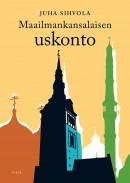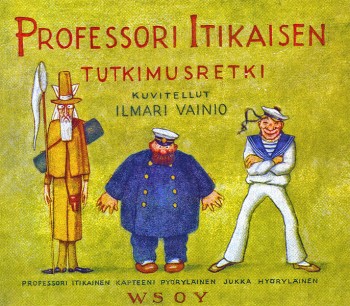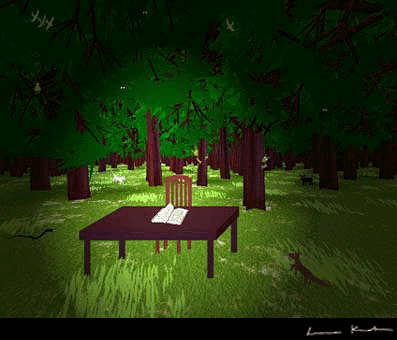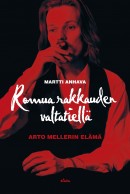Search results for "2011/04/matti-suurpaa-parnasso-1951–2011-parnasso-1951–2011"
Juha Sihvola: Maailmankansalaisen uskonto [The religion of the world citizen]
21 October 2011 | Mini reviews, Reviews
 Maailmankansalaisen uskonto
Maailmankansalaisen uskonto
[The religion of the world citizen]
Helsinki: Otava, 2011. 199 p., ill.
ISBN 978-951-1-21279-9
€ 29, paperback
This book focuses on the core questions of religious philosophy with special emphasis on Christianity, but it also addresses Judaism, Islam and the Middle East conflict as well as conflicts between Hindu nationalists and Muslims. Juha Sihvola, a professor of history, ends up advocating the view which holds that religion and science are largely independent of one another: under-standing the special nature of belief enables a justifiable critique of both religious fundamentalism and radical neo-atheism. In this work, Sihvola examines the relationship of faith and morals to history, freedom of conscience, religious tolerance and the possibilities of developing a more pluralistic society. The ideas of contemporary philosophers John Rawls and Martha Nussbaum seem closest to Sihvola’s own thinking. He formulates an optimistic vision in which religion that is liberal, non-fundamentalist and understands the special nature of belief faces important tasks ahead.
Translated by Ruth Urbom
Funny ha ha?
3 March 2010 | This 'n' that
 Comic books, graphic novels: the popularity of stories in pictures keeps on growing everywhere – and they may or not may be ‘comical’.
Comic books, graphic novels: the popularity of stories in pictures keeps on growing everywhere – and they may or not may be ‘comical’.
In Finland, sarjakuva (lit. serial picture) will celebrate its 100th anniversary in 2011. The first Finnish picture story, Professori Itikaisen tutkimusretki (‘Professor Itikainen’s expedition’, WSOY), by Ilmari Vainio, was published in 1911.
Ilmari Vainio (1892–1955) was a customs official who later also published two fairy tales and two handbooks for boy scouts. Professor Itikainen is a scientist who sets out on the sea and then finds himself, together with two brave seamen, facing various dangers in Africa, China and on the North Pole. A happy ending ensues in the form of safe arrival back in Helsinki on page 48. More…
The joy of work
24 October 2011 | Fiction, Prose
Short prose from Sivullisia (‘Outsiders’, Like, 2011). Introduction by Teppo Kulmala
Since I’ve been unemployed, I started a blog called Outsiders. It soon came to serve as work, and I became dependent on its benefits. Although describing being an outsider helped to anaesthetise me, and verbalising all of my afternoons didn’t even take up all my time, the feedback that came in was reward enough. I wouldn’t have taken any other reimbursement anyway because of the restrictions set on recipients of government benefits. Increasingly frequently I found myself longing for more. Even a short blog comment about being an outsider felt even truer than what I with my self-employed, jobless person’s competence was able to achieve in relation to being sidelined as an unemployed person, regardless of what kind of manager I had been in my previous life. When asking for more accounts of other people’s well-being, I wanted them to use their own names. I justified this because I did not want to read lies, which often come from and lead to chatter in cafés and on the web. Apart from the pure enjoyment of being present, using one’s own name – even in wrong-headed topics or notions – makes it easier to approach the harsh laws of the working world. When one knows that by using one’s own signature one is dragging one’s family into the mire, including those who have gone before and those yet to come, one is able to blaze trails along which one can outflank the passive to activate another, equally unemployed. I did not place any further requirements on the other commenters besides first name and surname, as the rules had been drawn up by professionals in their own field. The regulator’s work also requires skill, if not a tremendous craving, for damming up another flood of text so that one’s own advantages do not have a chance to dry up. To facilitate reading for myself and others, I introduced only a couple of restrictions, which I imagined that I, too, would be able to adhere to. Only one side of a sheet of A4 was to be used – that is, one page – and what people wrote had to be true. Truth, beauty and quality ensured that everyone would begin what they had to say by writing about their current work. More stories, anecdotes, even poems piled up than the law permits me to read – much less compile – during working hours. For this book I have selected only 157 stories from the Greater Helsinki area for the sake of efficiency. The faster you can read the work, the less time it will distract you from your main job. I chose to limit things to the capital area so that the stories about well-being from individuals linked to this place would seem to form a more integral work, or document at least, about what was happening in the Big H, the centre of the nation, at the start of the millennium. I will publish the tales of work from beyond the outer ring road at some later stage, if I manage to come to an agreement with the writers concerning intellectual property rights. More…
Indifference under the axe
9 March 2012 | Essays, Non-fiction

In the forest: an illustration by Leena Krohn for her book, Sfinksi vai robotti (Sphinx or robot, 1999)
The original virtual reality resides within ourselves, in our brains; the virtual reality of the Internet is but a simulation. In this essay, Leena Krohn takes a look at the ‘shared dreams’ of literature – a virtual, open cosmos, accessible to anyone, without a password
How can we see what does not yet exist? Literature – specifically the genre termed science fiction or fantasy literature, or sometimes magic realism – is a tool we can use to disperse or make holes in the mists that obscure our vision of the future.
A book is a harbinger of things to come. Sometimes it predicts future events; even more often it serves as a warning. Many of the direst visions of science fiction have already come true. Big Brother and the Ministry of Truth are watching over even greater territories than in Orwell’s Oceania of 1984. More…
Martti Anhava: Romua rakkauden valtatiellä. Arto Mellerin elämä [Garbage on the highway of love. The life of Arto Melleri]
10 November 2011 | Mini reviews, Reviews
 Romua rakkauden valtatiellä. Arto Mellerin elämä
Romua rakkauden valtatiellä. Arto Mellerin elämä
[Garbage on the highway of love. The life of Arto Melleri]
Helsinki: Otava, 2011. 687 p., ill.
ISBN 976-951-1-23700-6
€ 36, hardback
Arto Melleri (1956–2005) has been called the last Finnish bohemian poet. At the age of 35, he received the Finlandia Prize for a collection of poetry entitled Elävien kirjoissa (‘In the books of the living’) as well as an invitation to the Independence Day celebrations at the Presidential Palace, from which he was thrown out. The literary editor Martti Anhava traces his friend’s life from his schooldays in Ostrobothnia to his turbulent life in Helsinki. There are interviews with family members, friends, writers, musicians, theatre-makers; Melleri wound up studying dramaturgy at the Theatre Academy. The year 1978 saw the presentation of Melleri, Jukka Asikainen and Heikki Vuento’s play Nuorallatanssijan kuolema eli kuinka Pete Q sai siivet (‘The death of a tightrope walker or how Pete Q got wings’). Breaking completely with the mainstream political theatre of the 1970s, it became a cult show. The last volume by this poet of bold, often cruelly romantic visions was Arpinen rakkauden soturi (‘The scarred soldier of love’, 2004).
Translated by Hildi Hawkins
